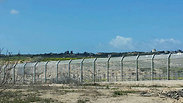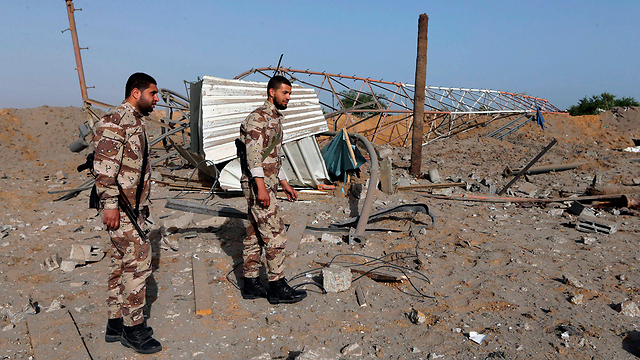
Why no one is talking about Gaza 'rounds' anymore
Analysis: The main achievement of Operation Protective Edge is concealed in the fact that Israel and Hamas have discovered no one is going to help them and they will have to get along on their own.
It was publicly reported that Israel and Hamas relayed messages to each other through a Palestinian source. We may assume that this Palestinian source came from Gaza, just like we may assume that Defense Minister Moshe Ya'alon didn't examine him thoroughly to make sure that he isn't hiding a Hamas membership card.
There have been direct talks between the IDF and Hamas in the past in regards to tactical incidents on the fence, but this time it's fundamentally different.
For the past six months, Hamas has been conveying a real desire for a direct dialogue with Israel on a long-term "tahadiya" (lull).
The political Israel is unprepared for public talks with Hamas on a long-term agreement, but the security and military Israel – mainly the coordinator of the government's activities in the territories and the IDF chief of staff – sees the advantage concealed in it, and it should be said in the defense minister's favor that he is not preventing it.
The fruits of this hidden dialogue are already being reaped on both sides, although in a small amount.

It's not that Hamas has suddenly developed the wings of an angel. The organization is still arming itself, and it's very possible that in the event of an internal deterioration in Gaza, the fire against Israel will be resumed. But Hamas is today in its worst political situation ever.
It is yearningly watching its traditional connection with Qatar going through the Kirya Base in Tel Aviv, the Egyptians continuing to turn a cold shoulder and the relations with the Palestinian Authority continuing to deteriorate.
Israel, unlike Palestinian President Mahmoud Abbas, is actually helping rebuild Gaza, and Hamas is paying Israel with coins of calm.
Moreover, Israel has carried out a few other tiny but significant steps, for example allowing students to leave from the Gaza Strip to Jordan instead of through Egypt.
It's true that there are no exports from Gaza yet and that there are no laborers leaving for Israel – but these steps are brewing slowly.
The Grad rocket was fired at Israel by members of the Islamic Jihad. The background was an internal conflict, not necessarily a provocation against Hamas.
Disputes over budgets, respect, appointments, etc, often end with rockets being fired on Israel in order to demonstrate who's in charge.
Since Tuesday's rocket fire, Hamas has been making every effort to show Israel that it is handling the incident, and the search for the rocket launchers was carried out publicly and with a lot of noise.
Hamas' main enemies in the Gaza Strip are the radical Salafi organizations, which are making an effort to stir up a war with Israel, while Hamas is arresting their members and preventing their activity.
The Islamic Jihad is an opposition to Hamas, but all in all it accepts its authority. The battle between these two organizations is over Iran's attention, but this rivalry appears to have been decided too: The Iranians likely stopped transferring funds to Hamas' military wing two months ago in response to the Hamas leaders' statements about the invasion of Yemen.
So Hamas is losing tens of millions of dollars which have been flowing in from Tehran since Operation Protective Edge.
Another term which no longer appears in the firing dialogue between the Gaza Strip and Israel since Operation Protective Edge is that no one is talking about "rounds" anymore.
Rocket fire from the Strip towards Israel is answered with a proportional airstrike, and that's the end of it. There is no response to a response to a response.
Still, Gaza was and remains the most explosive area. With all the criticism over the management of Operation Protective Edge, the main diplomatic achievement is concealed in the fact that Israel and Hamas have discovered that no one is going to help them and that they will have to get along on their own, and opportunities have indeed been created. But if we don’t play the cards that we currently have in our hands right, we will find ourselves in new rounds again.










